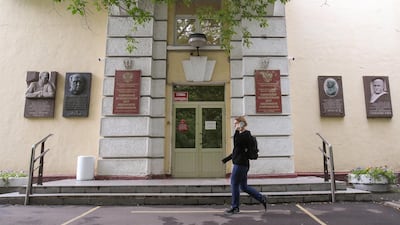Related: UAE to host new vaccine trial for Russia's Sputnik V
It is an anonymous, cream-coloured building in Moscow’s western suburbs.
Behind its 19th century walls, researchers claim to have cracked coronavirus.
The Gamaleya Research Institute of Epidemiology and Microbiology has said the "first registered Covid-19 vaccine" will be sent out to a world desperate for a coronavirus cure.
Using a two-stage process, the vaccine is called Sputnik V after the Russian pioneering space programme of the 1950s and 60s.
Sputnik V has a very different mission, although no less momentous. But the revelation has put the spotlight on the little-known Russian institute.
The three-storey building is named after Nikolay Gamaleya, a Soviet scientist and pioneer in microbiology and vaccine research. In the 1880s, he worked in Paris under Louis Pasteur, whose discoveries tamed several diseases including rabies and anthrax.
Back in Russia, Gamaleya continued his work, helping to vaccinate Red Army soldiers against smallpox.
The institute now named in his honour was founded in 1891 and is working on Sputnik V with Russia’s Ministry of Health and the Vector Institute. Once a key part of the Soviet Union’s biological warfare programme, it is now equipped to handle the most dangerous diseases safely.
The Gamaleya Insitute does not appear in Nature magazine's leading 100 world scientific institutions for research output, nor even in Russia's top 50.
Still, it claims impressive achievements, most notably a vaccine against Ebola, the deadly virus which periodically erupts in parts of Africa, most recently in the Democratic Republic of the Congo.
At the same time, some of its methods have raised eyebrows in sections of the global scientific community. The Ebola vaccine, GamEvac-Combi, is licensed in Russia for emergency use only, and does not have a World Health Organisation multinational licence.
Concerns have also been voiced about the speed at which Sputnik V has progressed.
But the vaccine has moved to the front of the pack, ahead of dozens of others, by getting approval ahead of Phase 3 trials.
The Russians insisted that Sputnik V is both safe and effective.
Alexander Gintsburg, the institute’s chief, compared coronavirus to a war in which people are dying, but he said fast-tracking does not mean cutting corners.
On Russian TV, he recently revealed his colleagues were now able to work without masks after taking the vaccine in March.
“After five months, our immunity is good. It corresponds to a significantly high level of antibodies which guarantees protection against any dose of Covid-19," said Mr Gintsburg.
Russia finally began Phase 3 trials in August, with Russian President Vladimir Putin declaring that month the vaccine “works quite effectively, helps to develop strong immunity and has gone through all the necessary tests".
He also revealed one of his daughters received the vaccine.
Other vaccines, like that being developed at the University of Oxford, are probably months behind Sputnik, not least because their Phase 3 testing involves tens of thousands of volunteers across the world.
European and American regulators have expressed concerns that the vaccine can be declared to work without the results of widespread trials.
The view of the WHO on testing in August was that “prequalification of any vaccine includes the rigorous review and assessment of all required safety and efficacy data”.
The WHO said it cannot comment on Sputnik V as it is yet to examine test data.
The Gamaleya Institute said the secret of its success is the long legacy of Russian scientific research in the field of vaccine development.
"In the absence of global health threats in recent decades, vaccine research has been on the fringes of the global pharmaceutical industry while Russian labs continued their research," Mr Gintsburg told the Financial Times newspaper in August.
“We are proud of the legacy of Russian science, which allowed us to develop the Covid-19 vaccine very quickly.”
There are other rewards for developing the first coronavirus vaccine, other than the gratitude of the entire world. In recent weeks, the first prices for an effective drug have begun to emerge. Modena, based in the US, has suggested between US$32 to $37 for a single dose.
So far, more than 1.2 billion doses of the Russian vaccine have been ordered by countries from Brazil to India.













